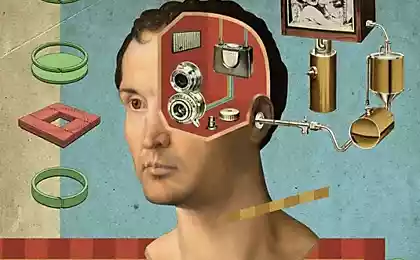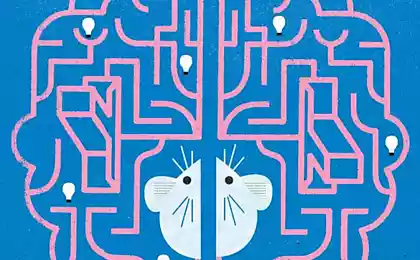377
How to learn to quickly memorize: 7 great tips
The ability to learn, and therefore to remember — perhaps one of the most important skills for a person. Unfortunately, those methods that we were taught to memorize information in school, not really working.
Therefore, we translated excerpts from the book "Make It Stick: The Science Of Successful Learning" ("Remember this: the Science of successful learning"), which was written by a Professor of psychology at Washington University in St. Louis.
1. Search: learn how to find memory norecord you are trying to remember something, you are literally looking for information, tried all options. You remember the idea, not any specific information that you crammed. This is helpful because it makes neural connections that are directly associated with the desired idea.
Fifty nine million seven hundred eighty seven thousand seven hundred fifty five
2. Treatment: communicate new ideas with the already known camcorda you are trying to convey information "in your own words" you treated her.
"If you can explain a new idea using existing knowledge, the better you will remember this new information, and create links that you can later play it back" — say the authors of the book.
For example, in physics it is easy to understand the heat transfer process, if you imagine a Cup of coffee that warms your hands — and sends you warm.
3. Alternation: learn different predmetima you work simultaneously on multiple issues, you are doing the striping. If you want to understand the essence of the subject — from the basics of economy to the art of baseball — then you will succeed better if you will consider a variety of cases.
An example from sports: a batter player improves their skills, if trained on different ways of presenting the ball. Simply because when you find yourself with a problem one on one, you first need to determine what kind of this problem, and then look for ways to solve it.
4. Generation: looking for answers samostoyatelnaya you are trying to find the answer yourself, before you get it, you are transforming. "Grasp the unknown, and independently deciding all questions, you likely remember the method of solution than in the case that someone sit down and show you how to do." During the study it is useful to try to find their own answers to the job — before for it will take the entire group. And at work you better be able to defend their ideas when promuchalas with a solution to the problem yourself, before the conversation with your boss.
5. Analysis: evaluate proishodyaschee.ne you will be distracted for a while to assess what is happening at the meeting (or project) from the outside, you analyze, evaluate what is happening. It is useful to ask yourself a few questions: What was done well? What could be improved? What does this mean? Researchers at the Harvard business school believe the so-called "reflective writing" (a brief analysis of what is happening) is a very effective method. Just 15 minutes spent at the end of the day on a brief analysis of important issues, increased the efficiency of work in some groups is 23%.
6. Mnemonics: use tricks to zapominanie when you use a rhyme to remember. A simple example from my childhood — the order of the colors of the rainbow are easy to remember: Every Hunter Wishes to Know Where Sits the Pheasant (Red, Orange, Yellow, Green, Blue, Indigo, Violet).
And although you have to remember something else, not a subject essence, you are creating important associations that help you remember the necessary information.
7. Calibration: make sure that you understand profilecode you understand something didn't you receive important feedback. This is when you objectively get rid of the illusions and try to see everything in more realistic light. This is important because we all suffer from "cognitive distortion": in fact often think I understand something, although in reality it is not.
Therefore it is better to listen to the comments of friends, to better understand the situation.published
P. S. And remember, just changing your mind — together we change the world! © Join us at Facebook , Vkontakte, Odnoklassniki
Source: precis.com.ua/poleznoe/kak-uluchshit-pamyat.html
Therefore, we translated excerpts from the book "Make It Stick: The Science Of Successful Learning" ("Remember this: the Science of successful learning"), which was written by a Professor of psychology at Washington University in St. Louis.
1. Search: learn how to find memory norecord you are trying to remember something, you are literally looking for information, tried all options. You remember the idea, not any specific information that you crammed. This is helpful because it makes neural connections that are directly associated with the desired idea.
Fifty nine million seven hundred eighty seven thousand seven hundred fifty five
2. Treatment: communicate new ideas with the already known camcorda you are trying to convey information "in your own words" you treated her.
"If you can explain a new idea using existing knowledge, the better you will remember this new information, and create links that you can later play it back" — say the authors of the book.
For example, in physics it is easy to understand the heat transfer process, if you imagine a Cup of coffee that warms your hands — and sends you warm.
3. Alternation: learn different predmetima you work simultaneously on multiple issues, you are doing the striping. If you want to understand the essence of the subject — from the basics of economy to the art of baseball — then you will succeed better if you will consider a variety of cases.
An example from sports: a batter player improves their skills, if trained on different ways of presenting the ball. Simply because when you find yourself with a problem one on one, you first need to determine what kind of this problem, and then look for ways to solve it.
4. Generation: looking for answers samostoyatelnaya you are trying to find the answer yourself, before you get it, you are transforming. "Grasp the unknown, and independently deciding all questions, you likely remember the method of solution than in the case that someone sit down and show you how to do." During the study it is useful to try to find their own answers to the job — before for it will take the entire group. And at work you better be able to defend their ideas when promuchalas with a solution to the problem yourself, before the conversation with your boss.
5. Analysis: evaluate proishodyaschee.ne you will be distracted for a while to assess what is happening at the meeting (or project) from the outside, you analyze, evaluate what is happening. It is useful to ask yourself a few questions: What was done well? What could be improved? What does this mean? Researchers at the Harvard business school believe the so-called "reflective writing" (a brief analysis of what is happening) is a very effective method. Just 15 minutes spent at the end of the day on a brief analysis of important issues, increased the efficiency of work in some groups is 23%.
6. Mnemonics: use tricks to zapominanie when you use a rhyme to remember. A simple example from my childhood — the order of the colors of the rainbow are easy to remember: Every Hunter Wishes to Know Where Sits the Pheasant (Red, Orange, Yellow, Green, Blue, Indigo, Violet).
And although you have to remember something else, not a subject essence, you are creating important associations that help you remember the necessary information.
7. Calibration: make sure that you understand profilecode you understand something didn't you receive important feedback. This is when you objectively get rid of the illusions and try to see everything in more realistic light. This is important because we all suffer from "cognitive distortion": in fact often think I understand something, although in reality it is not.
Therefore it is better to listen to the comments of friends, to better understand the situation.published
P. S. And remember, just changing your mind — together we change the world! © Join us at Facebook , Vkontakte, Odnoklassniki
Source: precis.com.ua/poleznoe/kak-uluchshit-pamyat.html























